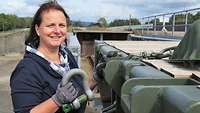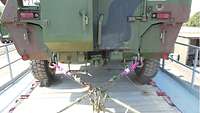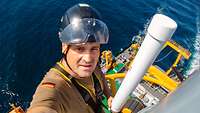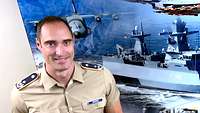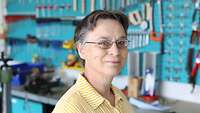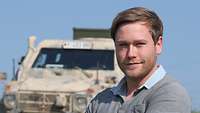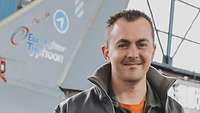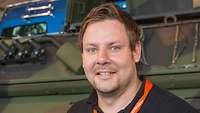Alles fest verzurrt? - Die Arbeit von Christina Krznaric
Alles fest verzurrt? - Die Arbeit von Christina Krznaric
Christina Krznaric is employed with the Bundeswehr Technical Center for Land-Based Vehicle Systems, Engineer and General Field Equipment (WTDWehrtechnische Dienststelle 41) in Trier. There she is responsible for the smooth rail transport of vehicles and equipment. She is a civil servant, is married, has one child and copes with her full-time employment by working from home where possible.
Ms. Krznaric, how did you actually come to work for the Bundeswehr?
My applications for an apprenticeship as an automotive mechatronics technician were repeatedly rejected at the time by other employers since their training workshops did not have sanitary facilities for female personnel. Then I got the hint to apply to the Infantry School in Hammelburg. This was 24 years ago.
After my apprenticeship I first completed the career training for the intermediate-level technical service. Following that, I also used the opportunity to advance to the higher-intermediate technical service in the field of mechanical engineering.
What exactly do you do at WTDWehrtechnische Dienststelle 41?
To put it simply, I’m responsible for determining that or how Bundeswehr equipment or vehicles, for instance, can be transported safely and without suffering damage from A to B by rail. In this regard, I am constantly alternating between the fields of theory and planning, on the one hand, and testing with its purely practical activities, on the other.
For each object to be examined I have to coordinate the best possible rail transport concept with the respective manufacturing company, the soldiers, the planning and scheduling department and the railway companies. Subsequently, I review this concept on a practical level at my agency’s impact test facility.
What happens at the impact test facility?
The tests can be imagined roughly like crash tests. The significant challenge to the material arises not from transport itself, but rather from the shunting of trains in the marshaling yard. In this process, the individual cars collide with different speeds and from both sides.
The “test item”, i.e. the vehicle or the equipment, will first be secured on a railroad car which will then be impacted by a buffer car with a mass of more than 110 t. Following the impact tests the “test item” will then be checked for damage and function.
What is the purpose of these tests?
We simulate here, under realistic controlled conditions, how high accelerations affect the cargo.
Our measurement results then influence the decision as to which lashing chains must subsequently be used in order to prevent damage. Thus, in recent years we have checked objects with weights of 600 kg just as with weights of 67 tons.
What does your everyday workday look like?
What is an everyday workday after all? Every day is different. That is exactly what is so special about my work! I read and write a lot of emails, of course.
As so often, it also depends on what has been planned for the day.
But generally we must coordinate our work with all armed services using the material prepared by us. That is why the communication effort is very high – both in the run-up to the impact tests and with regard to the project management.
That’s why, I am much in contact with different colleagues.
Luckily, I have the opportunity to have such conversations while working from home. That also makes my family happy, of course.
What is the thing you look forward to the most when going to work in the morning?
Even though this may sound very stereotyped: My first cup of coffee! It is a nice start into a partly stressful day.
And what is your motto in life?
I stick completely to Plato: “I don’t know a sure path to success, but I do know a sure path to failure: Trying to please everyone”.



